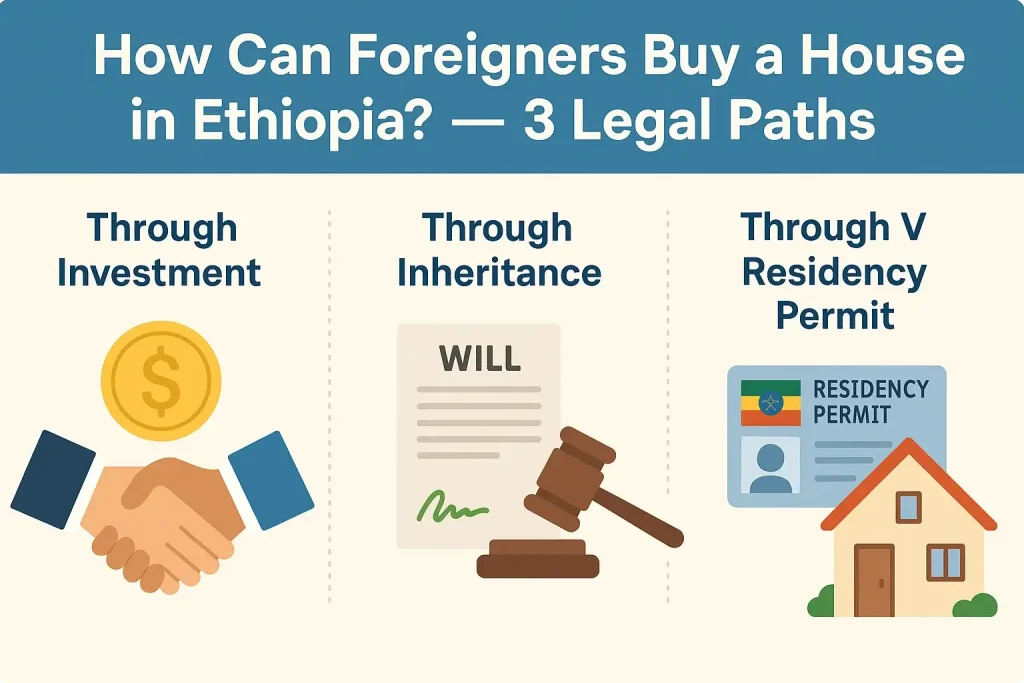
Can Foreigners Buy a House in Ethiopia? Discover everything you need to know about property ownership laws, real estate restrictions, and legal options for foreigners looking to invest in Ethiopian property.
Table of Contents
1. Can Foreigners Buy a House in Ethiopia? — The Big Rule You Must Know

If you’re asking, “Can foreigners buy a house in Ethiopia?”, the answer is yes — but there’s an important rule you need to understand first.
The Big Rule: You can buy a house in Ethiopia, but you can’t own the land beneath it.
Since 1975, Ethiopian law has made all land the property of the state and the people. This means:
- Land is owned by the government — no one, not even Ethiopian citizens, can privately own land.
- Buildings can be privately owned, including by foreigners.
So what does this mean for foreigners wanting to buy property?
You can buy a house, apartment, or commercial building in Ethiopia.
You can’t own the land it sits on. Instead, you’ll lease the land from the government — typically for 50 to 99 years, depending on the location and use.
Think of it like this: you’re securing a long-term lease for the land, giving you the right to build or own a structure on it, but the land itself always belongs to the state.
Key Takeaway: When it comes to Ethiopian property laws, the focus is on building ownership — foreigners can buy a house in Ethiopia, but the land is always leased, not owned.
2. How Can Foreigners Buy a House in Ethiopia? — 3 Legal Paths
If you’re asking can foreigners buy a house in Ethiopia, here are the three main legal ways to do it. While foreigners can’t own land, these options allow you to own a home or invest in property the legal way.
Option 1: Buy a Built Property (The Easiest Route)
Can foreigners buy a house in Ethiopia that’s already built? Yes — foreigners can purchase apartments, villas, offices, or other completed buildings.
- The building is yours.
- The lease on the land transfers to you, but only for the remaining years of the lease.
- Example: An expat buys a condo in Bole — they own the unit, but the land beneath is leased from the government.
Option 2: Lease Land and Build (For the Ambitious Buyer)
Another way foreigners can buy a house in Ethiopia is by leasing land directly and constructing their own building.
- Foreigners can lease land, usually by working with government agencies, investors, or developers.
- The process involves bidding for a lease, getting official approvals, and building your house on the leased land.
Can foreigners buy a house in Ethiopia this way easily? Not quite — it requires extra paperwork, local connections, and patience.
Option 3: Partner with an Ethiopian (For Land-Linked Ownership)
Since direct land ownership isn’t possible, some people wondering foreigners can buy a house in Ethiopia explore partnership options:
- Marry an Ethiopian citizen — this allows your spouse to own land, though the land remains in their name.
- Open a local company — foreigners can form a business with Ethiopian majority ownership. The company can lease land for business or residential purposes.

Final Word
If you’re asking can foreigners buy a house in Ethiopia, the key is to understand that while foreigners can own buildings, the land is always leased. Choose the legal path that fits your goals and make sure to get expert advice before proceeding.
3. The Leasehold System in Ethiopia Explained
When considering can foreigners buy a house in Ethiopia, it’s essential to understand how the leasehold system works — because while you can own the building, the land is always leased from the government.
Here’s what you need to know:
Typical lease terms:
Foreigners and locals lease land for 50 to 99 years. Leases can sometimes be renewed, but renewal isn’t automatic and depends on government approval.
Costs:
Lease prices vary significantly depending on location:
- In Addis Ababa, leases can be expensive due to high demand.
- In rural areas, land leases tend to be much cheaper.
Taxes:
Yes, annual property taxes apply to the value of your building — generally between 0.5% to 1% of its assessed value.
Pro tip:
Before buying a house or commercial building, always check how many years remain on the lease. A property with only 10 years left on the lease might not be a good long-term investment!
Reminder: While foreigners can buy a house in Ethiopia, remember that land is always leased — understanding the leasehold system is key to making a smart property investment.
4. Why These Property Ownership Rules Exist in Ethiopia
When people ask can foreigners buy a house in Ethiopia, they often wonder why land ownership is restricted. Ethiopia’s land laws are rooted in history and national priorities:
Anti-colonial history
Ethiopia’s laws were shaped to prevent foreign land grabs and protect national sovereignty. The country’s resistance to colonialism influenced policies that ensure land remains in the hands of the state and its people.
Protecting small farmers
About 80% of Ethiopians depend on agriculture for their livelihoods. The law aims to safeguard smallholder farmers from losing access to land due to large-scale foreign or domestic acquisitions.
Controlled urban development
Land lease policies help the government manage city growth and prevent uncontrolled speculation and skyrocketing property prices in places like Addis Ababa.
Fair or frustrating?
Many locals see these rules as fair and essential for protecting national interests. Foreign investors, however, often find the restrictions challenging when exploring options for buying a house in Ethiopia.
5. Risks & Red Flags

- Fake titles: Scammers sell “owned” land that’s really leased. Always verify at the local land office.
- Bureaucracy: Prepare for slow processes (bring patience and buna).
- Disputes: Inheritance or unclear leases can spark legal battles.
6. Steps to Buy Property (Checklist!)
- Find a property (use reputable agents or developers).
- Verify ownership (check lease documents at the Kebele office).
- Hire a lawyer (non-negotiable for contracts).
- Pay transfer taxes (~2–3% of property value).
- Register the sale (at the Urban Land Administration Office).
7. Alternatives to Buying
Not ready for the leap? Consider:
- Renting (flexible, no long-term risk).
- Investing via a local partner (if you trust them!).
Final Verdict: Worth It?
If you’re patient, well-advised, and in it for the long haul, yes. Ethiopia’s real estate market is growing (especially in Addis), but it’s not for the impulsive.
“Teff is planted slowly,” as Ethiopians say. Same goes for property!
Related Useful Tools on Our Site

Besides showing the Can Foreigners Buy a House in Ethiopia, our site offers:
- Ethiopian to Gregorian Date Converter: Convert any date instantly.
- Gregorian to Ethiopian Date Converter: This is for scheduling and documentation.
- Ethiopian Time Converter: Understand the unique Ethiopian time system.
- Convert Ethiopian Time to GMT: To convert Ethiopian Time to GMT
Can foreigners buy a house in Ethiopia?
No. Foreigners cannot own a house or land in Ethiopia outright. All land in Ethiopia is owned by the state, and private ownership of land is not allowed even for citizens. Foreigners can, however, lease property for long-term use, typically through investment schemes.
Can a foreigner own a house in Ethiopia?
No, a foreigner cannot own a house or land in Ethiopia. The only legal path is through leasing property for residential or commercial purposes under government agreements.
How can a foreigner invest in Ethiopian property?
A foreigner can invest in Ethiopian property by leasing land or buildings from the government. This is usually done through approved investment or business arrangements. Foreign investors can secure long-term leases, often ranging from 60 to 99 years.
Can a foreigner own a business in Ethiopia?
Yes, foreigners can own and operate businesses in Ethiopia in certain sectors open to foreign investment. However, some industries are restricted or require partnerships with Ethiopian nationals. All businesses must be registered with the Ethiopian Investment Commission.
How much money do you need to build a house in Ethiopia?
The cost to build a house in Ethiopia varies widely based on location, design, materials, and size. On average, construction costs can range from $300 to $600 per square meter in urban areas like Addis Ababa. Additional costs include lease payments for the land and government permits.
Are there exceptions that allow foreigners to own property in Ethiopia?
No, Ethiopian law does not allow foreigners to own residential property or land. The only options are long-term leasing or investing through a local company structure.
What is the maximum lease period for foreigners in Ethiopia?
Foreigners can typically lease land or buildings for 60 to 99 years, depending on the location and type of project. These leases must be approved by the relevant government authorities.
Can foreigners inherit property in Ethiopia?
Foreigners generally cannot inherit land or houses in Ethiopia. Inheritance involving property is subject to Ethiopian law, which reserves land ownership for Ethiopian citizens.
